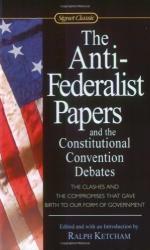
|
| Name: _________________________ | Period: ___________________ |
This test consists of 5 multiple choice questions, 5 short answer questions, and 10 short essay questions.
Multiple Choice Questions
1. What theory was flourishing in the 1770s in America?
(a) The theory of institutional design.
(b) The theory of evolution.
(c) The theory of free trade and open markets.
(d) The theory of intelligent design.
2. What thoughts did Mr. Madison express on the topic of elections during debate at the convention?
(a) He said that elections are too important to trust to the people.
(b) He said that elections are essential for free government.
(c) He said that elections could be bought too easily to be trusted.
(d) He said that elections are a step in dissolving government.
3. How did the New Jersey Plan resolve the question of the relationship of state laws to federal laws?
(a) State laws could still take precedence.
(b) The Supreme Court would decide on a state-by-state basis which laws took precedence.
(c) Congressional laws were still the law of the land.
(d) It gave the states priority in matters of trade, but the federal government priority in military matters.
4. What would happen if government officers did not receive salaries, in the opinion of the man who proposed this?
(a) The government would consist solely of landed gentry.
(b) Men who lusted for power and money would not run for office.
(c) Legislators would have to have wealthy patrons.
(d) Men who needed money would be liable to be influenced by special interests.
5. What was James Madison's feeling about the compromise?
(a) He felt that the convention was sacrificing federalism to distributed power.
(b) He felt that the convention was sacrificing large states to small states.
(c) He felt that the convention was striking the right balance.
(d) He felt that the convention was sacrificing justice for the small states.
Short Answer Questions
1. What did delegates suggest would happen if state legislatures chose Representatives for the House?
2. What were the delegates' intentions when they argued for election of Senators from state legislatures?
3. What did George Mason say he feared, in his argument on June 4?
4. Why did Mr. Wilson prefer the New Jersey Plan?
5. What did the Southern economy rely on at the time of the constitutional convention?
Short Essay Questions
1. What did delegates fear in the federal government's ability to veto state laws?
2. Where did the Federalist Papers come from?
3. Who opposed the election of Senators by state legislatures, and why?
4. Which delegates took positions on the term and election of the federal executive and what were their positions?
5. What was an argument for electing Senators in state legislatures?
6. What was the benefit of the proposal to elect representatives in the state legislatures?
7. What was Alexander Hamilton's argument about the need for a central government?
8. In what ways were delegates afraid of executive power?
9. Why did James Madison argue against the New Jersey Plan?
10. Why was democracy unpopular?
|
This section contains 851 words (approx. 3 pages at 300 words per page) |

|




